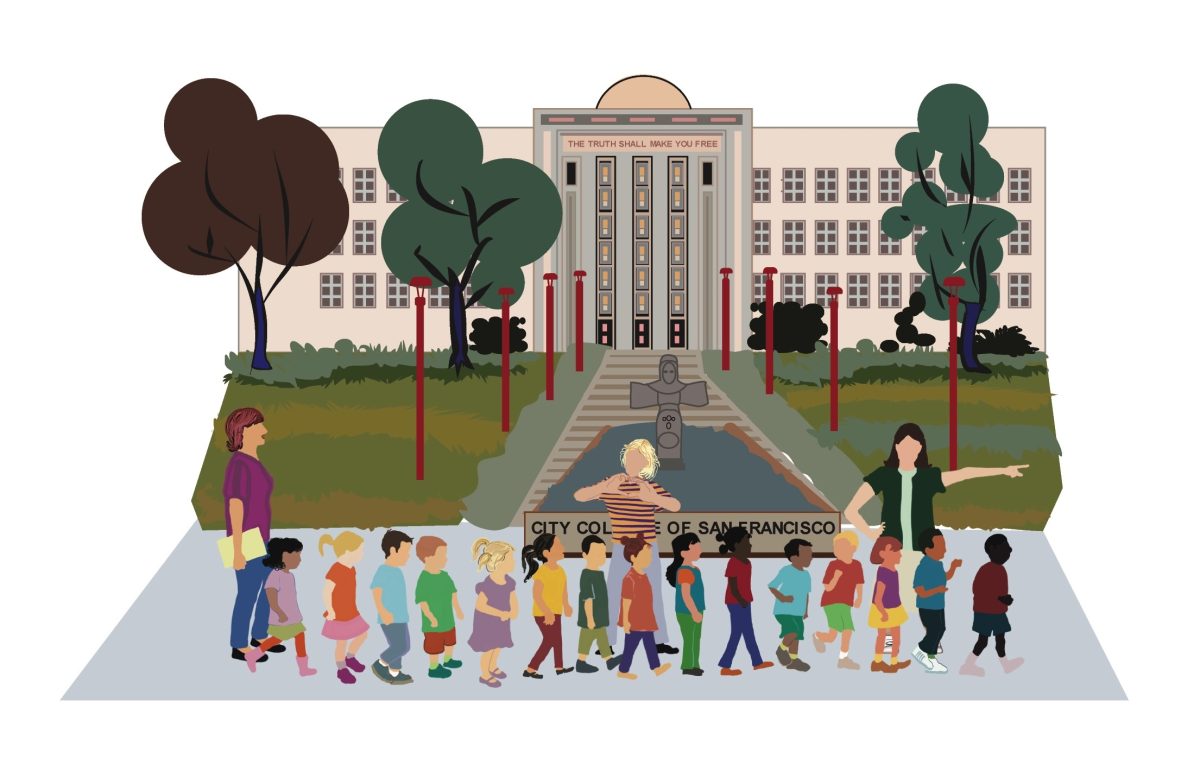
By Karla Lopes
Before heading to class, Sui Yu Chan’s family routine is already in full swing. As a mother of three kids, ages 3, 6 and 11, weekdays consist of drop-offs at different schools and daycares, studying for her Child Development and Family Studies (CDEV) major, and working.
While managing to build a better life for her kids, Chan shared that the demands of parenting, school and work can be overwhelming, especially when kids are home during school breaks. However, the 12 hours per week of childcare support at City College’s Family Resource Center (FRC) helps lighten her load.
“On days like these, I drop off all three kids, because I still need to do homework and study for college exams,” Chan said.
Xiaofang Nie, also a parent and CDEV student, receives vital support from the Drop-In program for her 8-year-old boy. Now that he is older and goes to school, Nie only needs a few hours of childcare during the week. But in 2018, when he was just 8 months old, the Parent Exchange Program (PEP), also offered at the FRC, made it possible for Nie to attend classes. “I could leave my baby with the FRC staff members, go to classes, and after that, I would come back here and pick him up.”
Building Support Networks
According to a survey conducted by the Institute for Women’s Policy Research, students with children in the United States are less likely to complete college than other students, and only 37% of them graduate with a degree within 6 years of enrollment compared to 60% of students without children. The research also shows that those students face obstacles like time, poverty and economic insecurity.
The study also highlights that beyond academic and financial support, college childcare services promote gender and racial/ethnic equity, as most student parents are women, generally single mothers, and people of color.
Tracey Faulkner, FRC Coordinator, was once a single mom and student. The year was 1995, she was a student at City College, and a single mom on welfare. Faulkner shared the challenges and endless waitlists to get childcare support for her kid in the late 90s. “It was because I had gotten the childcare that I was able to go to school,” shared Faulkner, recalling how she could finally get a spot for her kid at the City College preschool.
After some challenges to keep up with her studies, supporting other students on welfare, visiting food banks, paying rent and buying diapers, Faulkner kept believing in student parents’ genuine motivation to study. Along with some other welfare students, Faulkner fought for their right to an education and for a space where they could support themselves. That movement, with the money from a Christmas grant, resulted in the creation of the first Family Resource Center at City College in January 1999.
Support Under Strain
For 26 years now, the FRC has provided crucial resources for City College families. The Drop-In and Parent Exchange Program are the two childcare programs offered by the center. The Drop-In program requires that student parents stay in the same building while their children wait at the FRC playroom up to four hours per day. The space is limited and works on a first-come-first-serve basis. The PEP program provides up to 12 hours of weekly childcare for kids between 6 months and 5 years old, allowing parents to attend classes. In exchange, PEP parents must volunteer 1-3 hours weekly in the program.
Besides the supervised child care, the FRC also provides basic needs support, like free diapers, baby wipes, parenting and academic orientation. Student parents receive assistance with priority enrollment and other support services such as the Student Tutoring and Resource (STAR) center. Other childcare services are offered at different campuses, such as the Mission Center.
Despite the vital support it provides, the FRC faces ongoing limitations. The interviewees shared their desire for an outdoor play area for the kids and extended hours of childcare support, since the center currently closes at 3 p.m. and is unable to support students who need evening childcare. The program also faces low funding and a lack of faculty, which affects its ability to provide for the 20 families that currently rely on its support.
Editor’s Note: In a future issue, we will address what more can be done to relieve the strain on the vital community resource.
